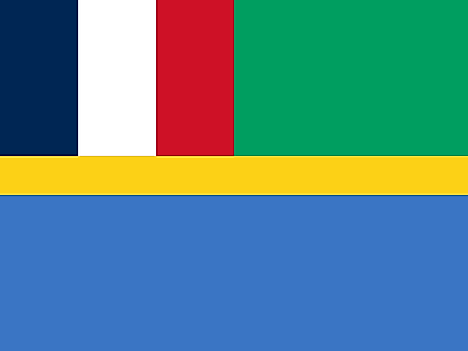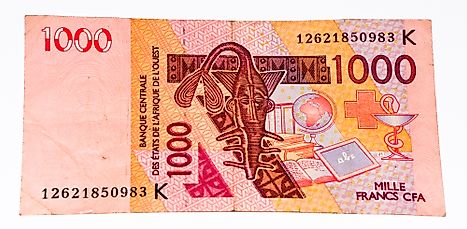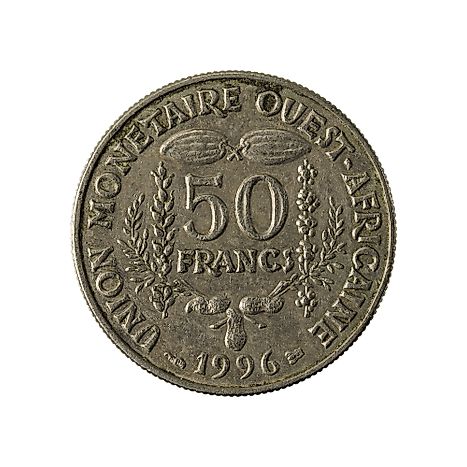Flags, Symbols, & Currencies of Gabon
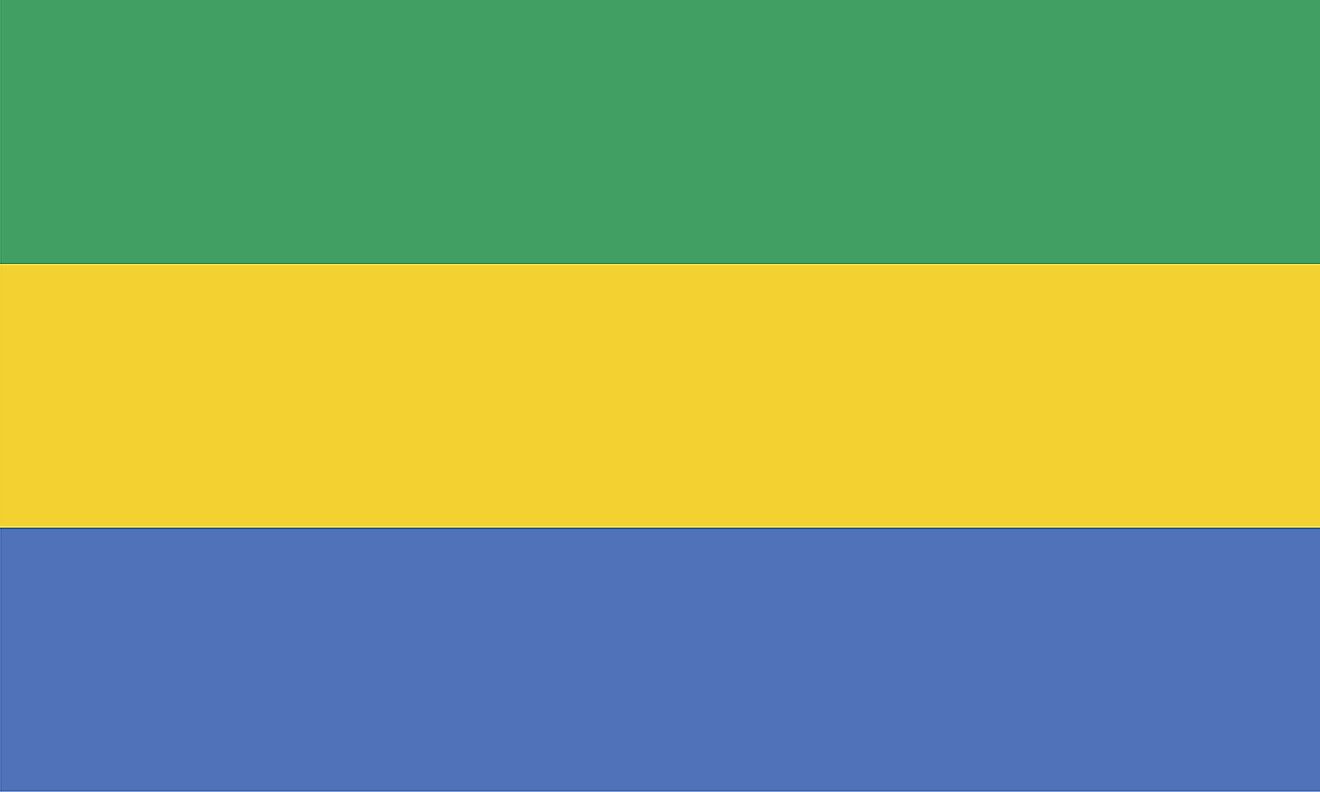
As Gabon approached its independence, it needed, among other things, a national flag that would identify it as an independent country. The colonial flag was not an option at this point because it contained the French tricolor flag on its canton. The colonial flag featured the traditional green and blue horizontal bands, separated by a thin yellow band at the center. The French tricolor flag features at the flag’s canton.
The current flag, adopted at independence on August 9, 1960, borrowed a lot from the colonial flag. It is a simple tricolor flag with three equal horizontal bands of green (top), yellow, and blue. The only modification done to the colonial flag was the removal of the French tricolor and the widening of the yellow band.
The three colors on the flag of Gabon carry regional, political, and cultural meanings. Yellow symbolizes two elements; the Sun and Equators, which pass through the country. Green represents Gabon’s natural resources, including the expansive forest cover. Finally, blue symbolizes the sea, particularly the South Atlantic Ocean. The national flag of Gabon has a height to length proportion of 3:4.
History of the Flag of Gabon
France took control of Gabon in 1839 and made it part of French Equatorial Africa in 1910. Under the colonial rule, the locals were forbidden from using any flag to discourage them from developing nationalistic sentiments. However, as decolonization fever moved across Africa, France granted Gabon limited autonomy within the French Community in 1958. Gabon immediately designed a flag, which was adopted in 1969. The flag featured green and blue horizontal bands separated by a thin yellow band. The French tricolor featured at the canton. This flag was redesigned to the current flag just a week to independence.
Symbols of Gabon
National Coat of Arms of Gabon
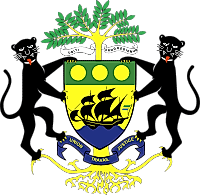
Gabon's coat of arms was adopted on July 15, 1963, and is composed of two panthers supporting a shield. The okoume tree is a symbol of timber trade, the panthers are for vigilance and courage, and the image on the shield represents moving towards a brighter future. The ribbon below the shield displays the national motto in French, "Union, Travail, Justice" ("Union, Work, Justice"); the ribbon above the shield reads in Latin: "Uniti Progrediemur" ("We shall go forward united").
National Anthem
- Anthem Title: “La Concorde
- Music and Lyricist: Georges Aleka Damas
- Date of Adoption: 1960
La Concorde (The Concord) is the official national anthem of Gabon. It was adopted on August 9, 1960, when Gabon gained its independence. Georges Aleka Damas, former Gabonese politician and president of the national assembly wrote and composed La Concorde in French. However, no translation was offered when the anthem was composed.
La Concorde (French)
Refrain :
Uni dans la Concorde et la fraternité
Éveille-toi Gabon, une aurore se lève,
Encourage l'ardeur qui vibre et nous soulève!
C'est enfin notre essor vers la félicité.
C'est enfin notre essor vers la félicité.
Éblouissant et fier, le jour sublime monte
Pourchassant à jamais l'injustice et la honte.
Qu'il monte, monte encore et calme nos alarmes,
Qu'il prône la vertu et repousse les armes.
Refrain
Oui que le temps heureux rêvé par nos ancêtres
Arrive enfin chez nous, réjouisse les êtres,
Et chasse les sorciers, ces perfides trompeurs.
Qui semaient le poison et répandaient la peur.
Refrain
Afin qu'aux yeux du monde et des nations amies
Le Gabon immortel reste digne d'envie,
Oublions nos querelles, ensemble bâtissons
L'édifice nouveau auquel tous nous rêvons.
Refrain
Des bords de l'Océan au cœur de la forêt,
Demeurons vigilants, sans faiblesse et sans haine!
Autour de ce drapeau, qui vers l'honneur nous mène,
Saluons la Patrie et chantons sans arrêt!
Refrain
The Concorde
Chorus:
United in the concord and the brotherhood,
Awake, Gabon, dawn is at hand.
Stir up the spirit that thrills and inspires us!
At last we rise up to attain happiness.
At last we rise up to attain happiness.
Dazzling and proud, the sublime day dawns,
Dispelling for ever injustice and shame.
May it rise, rise again and calm our fears,
May it promote virtue and banish warfare.
Chorus
Yes, may the happy days dreamed by our ancestors
Come for us at last, rejoice our hearts,
And banish the sorcerers, those perfidious deceivers
Who were sowing poison and were spreading fear.
Chorus
So that, in the eyes of the world and of friendly nations,
The immortal Gabon may maintain her good repute,
Let us forget our quarrels, let us build together
The new structure of which we are all dreaming of
Chorus
From the shores of the Ocean to the heart of the forest,
Let us remain vigilant, without weakness and without hatred!
Around this flag which leads us to honour,
Let us salute the Fatherland and ever sing!
Chorus
The Currency of Gabon is the CFA franc
The official currency of Gabon is the Central African CFA franc. This currency is also the official currency of five other states, including Chad, Cameroon, Republic of the Congo, Central African Republic, and Equatorial Guinea. France introduced the CFA franc to its colonies, including Gabon, in 1945.
Coins
France introduced the use of coins in its colonies in 1948, with the minting of 1 and 2 franc coins. The 5, 10, and 25 franc coins were introduced in 1958, followed by 100-franc coins in 1966. In 1975, the 500-franc coin was minted for the first time for individual states. Today, the CFA franc is minted in the denominations of 1, 2, 5, 10, 25, 100, and 500 pieces.
Banknotes
When the CFA franc was introduced, banknotes were minted in the denominations of 5, 10, 20, 100, and 1000 francs. Later, the 500, 5000, and 10,000 franc notes were introduced. Today, the notes are minted in the denominations of 500, 1000, 2000, 5000, and 10,000.
Historical Currencies of Gabon
Although Gabon, alongside five other countries in Central Africa, uses the CFA franc, this currency was only introduced in French Equatorial Africa in 1945. CFA franc replaced the French Equatorial African franc, which was in circulation from 1917.
